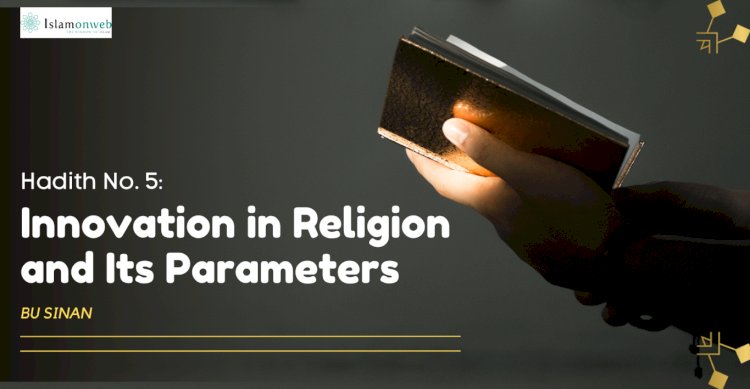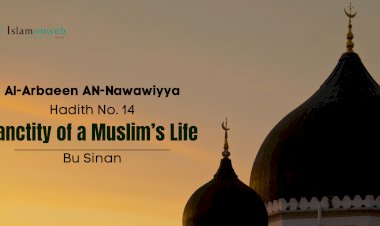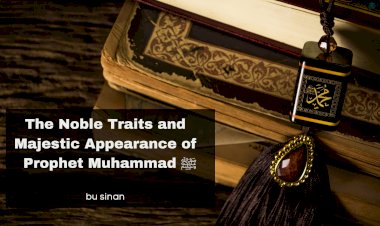Hadith No. 5: Innovation in Religion and Its Parameters
عَنْ أُمِّ المُؤْمِنِينَ أُمِّ عَبْدِ اللَّهِ عَائِشَةَ رَضِيَ اللَّهُ عَنْهَا قَالَتْ: قَالَ رَسُولُ اللَّهِ صَلَّى اللَّهُ عَلَيْهِ وَسَلَّمَ: "مَنْ أَحْدَثَ فِي أَمْرِنَا هَذَا مَا لَيْسَ مِنْهُ. . فَهُوَ رَدٌّ" رَوَاهُ البُخَارِيُّ وَمُسْلِمٌ (١)، وَفِي رِوَايَةٍ لِمُسْلِمٍ: "مَنْ عَمِلَ عَمَلًا لَيْسَ عَلَيْهِ أَمْرُنَا. . فَهُوَ رَدٌّ" (٢).
On the authority of Umm al-Muʾminīn, Umm 'Abdullah, ʿĀʾishah (may Allah be pleased with her), who said: The Messenger of Allah ﷺ said:
“Whoever innovates something in this matter of ours that is not from it, it will be rejected.”
It is narrated by Al-Bukhari and Muslim. In a narration by Muslim:
"Whoever does an act that is not in accordance with our matter, it will be rejected."
About the Narrator: ʿĀʾishah bint Abu Bakr (may Allah be pleased with her)
Umm al-Mu'mineen (Mother of the Believers) is the title given to all wives of Prophet Muhammad’s ﷺ. This title signifies their esteemed position as the Prophet Muhammad’s ﷺ wives, entitling them to respect and honour. It also highlights their status as a spiritual mother to all believers, though it excludes any familial rights such as inheritance or marriage restrictions.
Umm al-Muʾminīn (Mother of the Believers) is the title given to all the wives of Prophet Muhammad ﷺ . This title signifies their esteemed position as the Prophet Muhammad’s ﷺ ( wives, entitling them to respect and honour. It also highlights their status as spiritual mothers to all believers, though it excludes any familial rights such as inheritance or marriage restrictions.
The Prophet ﷺ gave her the kunya (nickname) Umm ʿAbdullāh after her nephew, ʿAbdullāh ibn al-Zubayr, the son of her sister Asmāʾ (raḍiya Allāhu ʿanhumā). Some scholars suggest this nickname was linked to a miscarriage she experienced, but the stronger opinion relates it to her nephew, as she had no children.
ʿĀʾishah (raḍiya Allāhu ʿanhā), honoured with the titles as-Ṣiddīqah bint as-Ṣiddīq (The Truthful, Daughter of the Truthful) and al-Ḥabība bint al-Ḥabīb (Beloved Daughter of the Beloved), was the daughter of Abū Bakr as-Ṣiddīq, the Prophet Muhammad’s ﷺ closest companion and the first caliph of Islam. Her esteemed position as both the wife of the Prophet ﷺ and the daughter of his dearest companion underscores her unique role in Islamic history. Her beloved status is vividly illustrated in a ḥadīth reported by al-Bukhārī and Muslim, where the Prophet ﷺ was asked by ʿAmr ibn al-ʿĀṣ about whom he loved the most. He replied unequivocally, "ʿĀʾishah." When further asked about the man he loved most, he answered, "Her father."
She was engaged to the Prophet ﷺ in Makkah when she was six years old, and the marriage was consummated in Madīnah when she was nine. This occurred in Shawwāl following the Battle of Badr in the second year after Hijrah.
She was the Prophet’s beloved wife, known for her intelligence, piety, and sharp memory. She was 18 years old when the Prophet ﷺ passed away, and she lived for about 40 more years, passing away in 58 AH during Ramaḍān. Abū Hurayrah led her funeral prayer as the governor of Madīnah at the time.
The wisdom behind ʿĀʾishah’s (raḍiya Allāhu ʿanhā) marriage to the Prophet Muhammad ﷺ at a young age lies in the vital role she would play in preserving and transmitting the teachings of Islam. Her exceptional intelligence, sharp memory, and close relationship with the Prophet ﷺ allowed her to become an unparalleled scholar and authority on the religion. After his passing, ʿĀʾishah lived for approximately 40 years, dedicating herself to educating the Muslim community, answering complex juristic questions, and narrating key events and sayings of the Prophet. She was a trusted reference for many companions and successors, who frequently sought her guidance on matters of fiqh (jurisprudence), ḥadīth, and the Prophet’s personal life. Her long life and scholarship ensured that the teachings of Islam were conveyed authentically to future generations, solidifying her legacy as one of the greatest contributors to Islamic knowledge.
ʿĀʾishah (raḍiya Allāhu ʿanhā) narrated around 1,210 aḥādīth, although some scholars have counted 1,010. Of these, 174 are agreed upon by al-Bukhārī and Muslim, while al-Bukhārī narrated 74 exclusively, and Muslim narrated 68.
Her narrations cover diverse aspects of Islamic teachings, including the Prophet’s ﷺ private life, jurisprudence, and other religious matters. Her narrations and verdicts remain vital to Islamic scholarship.
Explanation of the Hadith
The hadith is foundational in Islamic jurisprudence, encapsulating a universal principle about the rejection of innovations in religious matters. Linguists explain that the term "radd" in the hadith means "rejected," implying that any action or practice contrary to the prescribed way of the Prophet ﷺ ( is invalid and unacknowledged.
The phrase "ليس عليه أمرنا" (not in accordance with our affair) refers specifically to the rulings of Allah and His Messenger, encompassing all that is legislated and continuously practised in Islam. This hadith is considered one of the Prophet's ﷺ concise yet comprehensive statements (jawami' al-kalim), as it explicitly negates the validity of every innovation (bid‘ah) or unauthorised practice in religion. Scholars have used it to invalidate prohibited contracts and deem their consequences null, as well as to deduce that prohibition in Islamic law indicates invalidation (fasād).
In the alternate narration, "من عمل عملاً ليس عليه أمرنا فهو رد", the wording emphasises rejecting not only innovations introduced by their originators but also actions performed by others following such innovations. This version serves as a direct response to those who attempt to justify their actions by claiming they are not introducing anything new. Thus, this hadith is crucial in countering illegitimate practices and must be preserved, disseminated, and utilized to eliminate reprehensible acts.
The phrase "من أحدث" (whoever innovates) signifies the initiation of something new, referring specifically to matters of religion. The mention of "في أمرنا" (in our matter) highlights religious practices as delineated by Allah and His Messenger. The phrase "ما ليس منه" (that is not from it) excludes any action that lacks support from the established principles and evidence of Islamic law. The result, "فهو رد" (it will be rejected), confirms the invalidity of such practices, whether due to their lack of legitimacy, non-conformity to conditions or pillars, or excessiveness beyond what is prescribed.
Permissible Innovations
It is important to clarify that not all innovations are prohibited. Innovations that align with the principles of Islam, such as those supported by its evidence or objectives, are acceptable.
The Prophet ﷺ clarified with the phrase "ما ليس منه" "mā laysa minhu" (that is not from it) that innovations are rejected only when they conflict with Sharīʿah. Conversely, practices that align with Sharīʿah are not rejected.
This understanding is further supported by another ḥadīth in Ṣaḥīḥ Muslim, narrated by Jarīr ibn ʿAbdullāh:
"Whoever establishes a good practice in Islam will have its reward and the reward of those who act upon it without diminishing their rewards. And whoever establishes an evil practice in Islam will bear its burden and the burden of those who act upon it without diminishing their burdens."
In Ṣaḥīḥ al-Bukhārī, under the section on Tarāwīḥ prayer, it is narrated that during the time of ʿUmar ibn al-Khaṭṭāb (raḍiya Allāhu ʿanhu), he saw people praying individually or in small groups during Ramaḍān. He remarked, "I think it would be better if these people were gathered behind one reciter." He then organised the congregation under Ubayy ibn Kaʿb as the prayer leader. Observing this later, ʿUmar said, "Niʿmat al-Bidʿah Hādhihi" ("What a good innovation this is"). A similar narration appears in al-Muwaṭṭaʾ, confirming his use of the term.
Reconciling with "Every Innovation is Misguidance"
The hadith narrated by Abu Dawud from al-‘Irbad ibn Sariyah, which says: "Beware of newly invented matters, for every newly invented matter is an innovation, and every innovation is misguidance", shall be reconciled based on the above:
The hadith’s general wording is contextually specific. Based on the earlier-mentioned hadiths, this refers to only those innovations that contradict the Qur’an, Sunnah, consensus, or authentic tradition.
Imam al-Nawawi elaborated on this in his book Tahdhīb al-Asmā’ wa al-Lughāt, defining bid‘ah in its religious context as "introducing something that did not exist during the time of the Messenger of Allah ﷺ." He noted that innovations are divided into good and bad categories. Similarly, the widely respected scholar Imam Abū Muḥammad ʿAbd al-ʿAzīz ibn ʿAbd al-Salām, stated in his book Qawāʿid: "Innovations are categorized into obligatory (wājib), forbidden (ḥarām), recommended (mandūb), disliked (makrūh), and permissible (mubāḥ). The method to discern this is to evaluate the innovation against the principles of Sharīʿah. If it aligns with obligations, it is wājib; if it contradicts prohibitions, it is ḥarām; if it aligns with recommendations, it is mandūb; if it aligns with dislikes, it is makrūh; and if it aligns with permissibility, it is mubāḥ." (End of Imam Al-Nawawi’s quote)
Imam al-Shāfiʿī (raḍiya Allāhu ʿanhu) explained that muhdathāt (innovations) in matters are of two types. The first is what contradicts the Qur’ān, Sunnah, a tradition (āthār), or consensus (ijmāʿ). Such an innovation is a misguided one (bidʿah ḍalālah). The second type includes innovations of goodness that do not conflict with any of these sources. These are innovations that are not blameworthy. This statement is recorded by Imām al-Bayhaqī in Manāqib al-Shāfiʿī (1/469) and mentioned by Ibn Ḥajar in Fatḥ al-Bārī (13/267).
Additionally, al-Ḥāfiẓ Abū Nuʿaym narrates in Ḥilyat al-Awliyāʾ (9/76) from Ibrāhīm ibn al-Junayd, who said: Ḥarmalah ibn Yaḥyā reported that he heard Muḥammad ibn Idrīs al-Shāfiʿī (raḍiya Allāhu ʿanhu) say:
“Innovations are of two types: praiseworthy (maḥmūdah) and blameworthy (madhmūmah). What aligns with the Sunnah is praiseworthy, and what contradicts the Sunnah is blameworthy.”
He supported this distinction with the statement of ʿUmar ibn al-Khaṭṭāb (raḍiya Allāhu ʿanhu) regarding the congregational prayer of Tarāwīḥ during Ramaḍān:
“What an excellent innovation this is (Niʿmat al-Bidʿah Hādhihi).”
This statement highlights the nuanced approach of the early scholars, distinguishing between innovations that align with the principles of Islam and those that deviate from them.
This concept has been explained by prominent scholars from all schools of fiqh.
Shaykh Ibn ʿĀbidīn al-Ḥanafī mentioned in his Ḥāshiyah (1/376):
"An innovation (bidʿah) can be obligatory (wājib), such as establishing proofs to refute the arguments of misguided sects or learning grammar to understand the Qurʾān and Sunnah. It can be recommended (mandūb), such as building a ribāṭ (hostel for travelers or seekers of knowledge) or a madrasa, or engaging in any act of goodness not practiced during the early generations. It can also be disliked (makrūh), such as decorating mosques excessively, or permissible (mubāḥ), such as indulging in enjoyable foods, drinks, and clothing."
Imām Muḥammad al-Zurqānī al-Mālikī mentioned in his commentary on al-Muwaṭṭaʾ (1/238) while explaining the statement of ʿUmar ibn al-Khaṭṭāb (raḍiya Allāhu ʿanhu):
"What an excellent innovation this is" (Niʿmat al-Bidʿah Hādhihi). He called it an innovation (bidʿah) because the Prophet (ṣallā Allāhu ʿalayhi wa sallam) did not establish the practice of congregational Tarāwīḥ prayer in this specific manner, nor was it observed during the time of Abū Bakr (raḍiya Allāhu ʿanhu). Linguistically, bidʿah refers to something newly introduced without a prior example. In Islamic terminology, it refers to something introduced that contrasts with the Sunnah, i.e., something not practiced during the lifetime of the Prophet (ṣallā Allāhu ʿalayhi wa sallam). However, it is then divided into the five legal rulings (aḥkām al-khamsah).
Imām Abū Ḥāmid al-Ghazālī stated in his book Iḥyāʾ ʿUlūm al-Dīn, in the chapter on the etiquettes of eating (2/3):
"What is said to be an innovation after the time of the Messenger of Allah (ṣallā Allāhu ʿalayhi wa sallam) is not necessarily prohibited. Rather, what is prohibited is an innovation that opposes an established Sunnah or abolishes a matter of the Sharīʿah while its reason remains valid. In fact, innovation may become obligatory in certain circumstances when conditions change."
Shaykh Shams al-Dīn Muḥammad ibn Abī al-Fatḥ al-Baʿlī al-Ḥanbalī stated in his book al-Muṭṭaliʿ ʿalā Abwāb al-Muqniʿ (p. 334) in the chapter on divorce:
"A bidʿah (innovation) is something introduced without a prior example. Innovations are of two types: innovations of guidance (bidʿat hudā) and innovations of misguidance (bidʿat ḍalālah). Furthermore, innovations are divided according to the five legal rulings of obligation (wājib), recommendation (mandūb), permissibility (mubāḥ), dislike (makrūh), and prohibition (ḥarām)."
In conclusion, the nuanced understanding of bidʿah (innovation) as articulated by Islamic scholars reflects the adaptability and comprehensiveness of Sharīʿah. As summarised by the great Islamic scholar of his time title as titled as Sultan al-ʿUlamaʾ ʿIzz ibn ʿAbd al-Salām in his book Qawāʿid al-Aḥkām (2/172-174):
"Innovations are divided into obligatory (wājib), forbidden (ḥarām), recommended (mandūb), disliked (makrūh), and permissible (mubāḥ). The method to determine this is to evaluate the innovation against the principles of Sharīʿah. If it aligns with the rules of obligation, it is obligatory; if it falls under the rules of prohibition, it is forbidden; if it aligns with recommendation, it is recommended; if it aligns with dislike, it is disliked; and if it aligns with permissibility, it is permissible."
This classification underscores that bidʿah must be assessed within the framework of Islamic principles, considering its purpose and alignment with the objectives of the Sharīʿah. Not all innovations are inherently negative; their value depends on their adherence to or deviation from the Qurʾān, Sunnah, and the broader goals of Islamic law. Such an approach allows Islam to address changing circumstances while remaining rooted in its divine principles.
Disclaimer
The views expressed in this article are the author’s own and do not necessarily mirror Islamonweb’s editorial stance.
























Leave A Comment